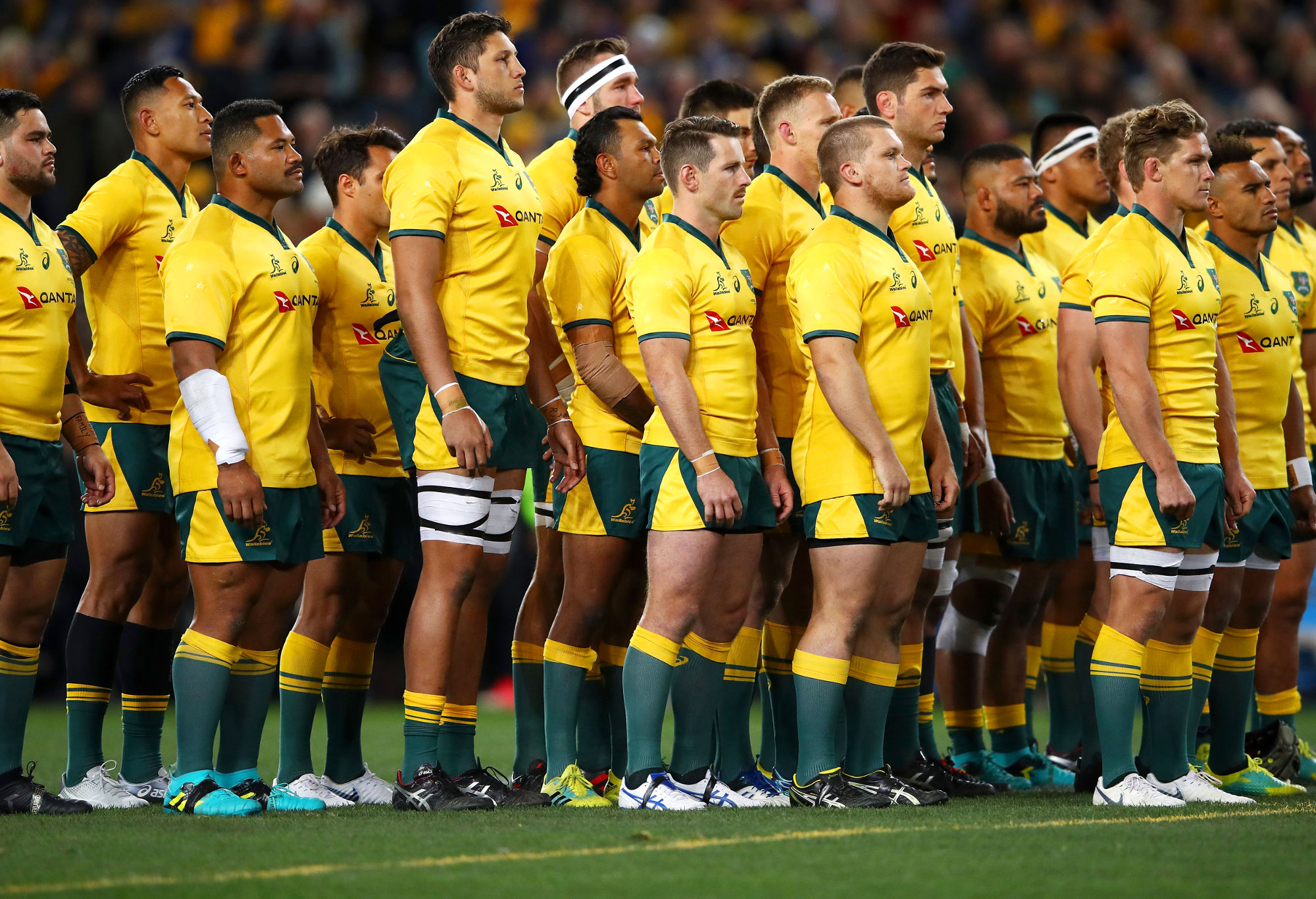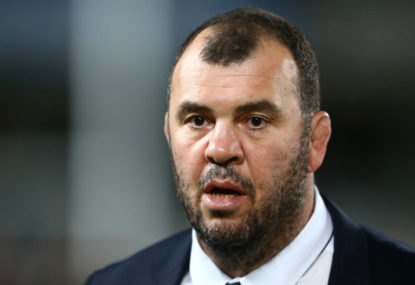Google ‘Cheika fired’ and the first result will be a Reuters article from early June of 2018, which discusses how ‘fired up’ Michael Cheika was to tangle with Joe Schmidt’s Irish squad.
The main angle in the article was Cheika’s role in developing Leinstermen like Johnny Sexton, resulting in the ‘best Irish team ever’ in Cheika’s view. (Cheika is still helping Leinster. Scott Fardy’s stardom at Leinster came about because Cheika deemed the rock-hard former Wallaby too slow for his preferred ball-in-hand style leading into 2018 and 2019).
We now know Sexton was benched for the first Test, the only Irish loss, and Ireland joined England and Scotland as recent winners on Australian soil, even without their inspirational captain Rory Best on tour.
If you Google ‘Cheika axed’, you’ll see my article about the SS Waratah due to the presence of doomed Victorian lumberjacks on the ill-fated ship.
It’s only if you Google ‘Cheika sacked’ that you’ll see a current opinion essay on ESPN Scrum by Greg Growden arguing Cheika and his entire coaching and managerial team should be fired, because “this rot has to stop.”
Growden faults Cheika for arrogance but I was struck more by his description of his version of the Wallabies as ‘pedestrian.’
The Wallaby attack has indeed looked ponderous – and scoring has been low in 2018.
Given that Cheika dispensed of Fardy for being too slow, and has preached a gospel of fire, pace, offense, risk, and the ‘Austrialian Way,’ I thought it would be interesting to see what the numbers look like from 2018 so far – all four tests admittedly against the top two teams, but all were at home, with plenty of planning. Cheika was, remember, ‘fired up.’
The first number that surprised me was the rather heavy 2018 Wallaby deficit in total carries per game. Cheika’s ‘run it’ team has averaged 26.25 fewer carries per test than the opposition.
The logic of playing ball-in-hand attacking rugby is premised on two fundamentals: (1) maximising carries and (2) attack efficiency.
The Wallabies have only scored 1.5 tries per 2018 test (by way of contrast, new rival Rassie Erasmus has managed to devise 3.25 tries per game in 2018 against lesser opponents), so the efficiency is clearly low.
However, this could be overcome by having more carries than the opposition (especially in the right places). That is not happening. Having over 26 fewer carries per game puts all the focus on efficiency.
The Cheika Wallabies have had to do more with less, and thus far, have done less with less.
One might wonder: maybe fewer carries happened because the ball was being passed and offloaded more? No.
For example, in the four 2018 tests, the Wallabies have passed the ball an average of 25.75 times less than their visiting opponents.
Also, the Wallabies have not busted tackles more than their foes.

(Photo by Mark Kolbe/Getty Images)
Cheika has used lighter ball carriers to bear the load than opponents or rivals and therefore has a minus-6.25 tackle-break disadvantage average in 2018.
The Wallabies scramble well to defuse line breaks, but no team has a great solution to being run over in the tight-loose.
The Wallabies’ top three players for each test in number of carries featured at least two backs, instead of big forwards dominating, and against New Zealand, the lightest forward (Michael Hooper) was the main workhorse.
Israel Folau is out, and he has been the top carrier for Cheika. Folau has been almost as important as Jamie Roberts was for Warren Gatland back in the day.
By contrast, Rassie Erasmus has followed the template of last year’s ‘perfect almost-win’ at Newlands against the All Blacks (adding finishing sophistication by Willie le Roux, Aphiwe Dyantyi, and Faf de Klerk, over Allister Coetzee’s stale picks of Andries Coetzee, Courtnall Skosan, and Ross Cronje).
This was done by using workhorses Duane Vermeulen, Pieter-Steph du Toit, Eben Etzebeth, Franco Mostert, Tendai Mtawarira, and Siya Kolisi to bend the opposition line.
Australia is struggling to bust through or evade red zone defences.
Against Ireland, the Wallabies only offloaded five times per test on average. The rate of offloading is typically a coach-driven directive.
By way of contrast, Erasmus’ Boks offloaded 19 times in Durban, often opening the Pumas up in their own 22 by quick hands even from forwards (eight offloads).
If the Wallabies had developed a stingy enough defence under Cheika and his assistant coaches in the last four seasons, perhaps this fecklessness on attack could still reap narrow wins.
But the 2018 Wallabies are completing tackles at less than 84 per cent, with the lowest stat coming in Bledisloe 1: 78 per cent. Cheika’s ‘best’ players are the biggest culprits, so it is likely to continue.
Missing almost 26 tackles a match puts even more emphasis on attack frequency and efficiency.
And this is where set-piece woes really undercut Cheika. The stability of the attack, the likelihood of scoring tries, and the planning of moves are all much easier to work on from lineout or post-scrum setups.
The Wallaby scrum has been pinged in escalating fashion, culminating in a five-penalty horror show in Sydney last weekend.
Once a scrum is known to draw penalties, it usually continues by reputation. On the other hand, the Bok scrum has drawn eight fewer penalties in 2018 than Cheika’s Ledesma-shorn pack.
The Wallaby lineout has been burgled 11 times in 2018 while the Bok lineout has only been pinched from twice.
How can a new coach using six different locks and a wobbly thrower be outperforming a four-year Wallaby coaching squad?
Lineout ball is every test team’s best-attacking platform which has been well-documented.
[latest_videos_strip category=”rugby” name=”Rugby”]
But Pooper is supposed to even things out by winning turnovers.
It’s true the Wallabies are in the positive on turnover-won-versus-lost in 2018 (+1.5 per game), but that simply cannot make up for the extreme pressure that comes with losing lineouts in the Wallaby half, or the way it demoralizes a team to lose a lineout on attack.
Cheika has to take a long hard look at himself and his coaches, while Rugby Australia has to take a long look at Cheika if the Wallabies are to build into the Rugby World Cup next year favourable draw and all.
The trends do not look good.
Erasmus seems to be finding answers to attack issues. The Boks have easily outpassed and offloaded more, still won the gain line, tightened up set pieces, and on defence, made their tackles and also are +7 on turnovers won/lost.
Eden Park and Brisbane are looming large.
Cheika simply has to find a way to score, again.






























































































